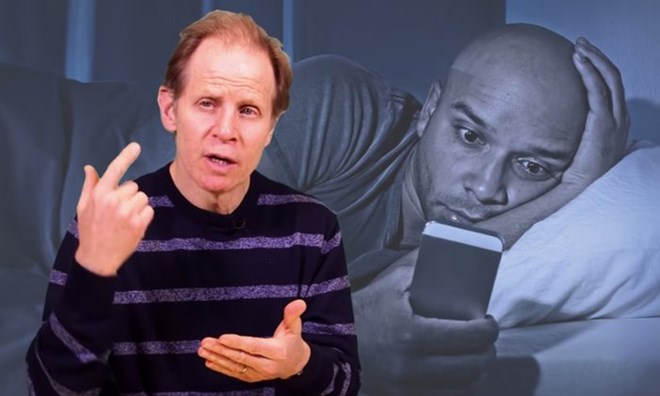
Wednesday June 26, 2019
BY LOUISE BEVAN

(YouTube Screenshot | Science Insider)
“People are exposing their eyes to this stream of photons from these objects,” says Dr. Dan Siegel, explaining just how impactful screens can be on our sleep. “They basically tell your brain, ‘Stay awake!'”
Dr. Dan Siegel is a clinical professor of Psychiatry at the UCLA School of Medicine, and he’s made it his business to help people recognize the serious problem of screen time interfering with sleep time. It’s not an insurmountable problem, and that’s way Dr. Siegel has so much to say about it; we have the power to exercise control over the digital domain and reclaim healthy sleep!
Whether it’s 10 p.m., 11 p.m., or midnight, staring at your phone screen right before bedtime communicates to your busy brain that it’s not time to go to sleep yet. The irony being, of course, that it is. You create a Catch-22 situation for yourself; you’re staring at your screen because you’re not sleepy, but you’re not sleepy because you’re staring at your screen.
What is there to be done?
In a fascinating video for Business Insider, Dr. Siegel explains how staring into your backlit smartphone or laptop tells your brain, “Don’t secrete melatonin yet.” Melatonin is the naturally produced hormone that regulates sleeping and waking cycles, and if we cheat ourselves out of it, our sleep will inevitably suffer.
Melatonin is produced by the body’s pineal gland. The National Sleep Foundation explains that “when the sun goes down and darkness occurs, the pineal is “turned on” […] and begins to actively produce melatonin.” This occurs as early as 9 p.m., so if you are prone to bouts of late-night screen time, you are forcibly denying your body’s invitation to sleep.
“You’re checking [your phone] some more because you’re up, after all,” the doctor continues, empathizing with the vicious cycle, “so why shouldn’t you check?”
“We now know,” he goes on, “that what sleep is likely doing is allowing your active neurons to rest.” Sounds good, doesn’t it? “But more than that,” Dr. Siegel continues, “the supportive cells, called ‘glial cells,’ are now cleaning up the toxins that the neurons produced.” In effect, sufficient sleep is like a deep clean for the brain.
And we need a lot more than most people think. If we don’t get from seven to nine hours of sleep a night, then the toxins are not efficiently cleaned away. Besides sounding pretty nasty (and even a little triggering to overly tidy types!), this actually has a tremendous impact upon our efficacy the following day.
“A small percentage of people are genetically different,” Dr. Siegel clarifies. However, for the vast majority of us, anything less than seven hours of sleep per night is simply not enough to render us at our best.
Be wary of the “badge of courage,” the doctor says, jovially. We all know that guy (or girl) who swans into the office with an oversized coffee, bragging “I only slept three hours last night!” But it’s truly nothing to brag about. Sleep deprivation impairs memory and attention span, problem-solving skills are compromised, and insulin levels are turned upside down.
This last issue could be particularly impactful for anybody watching their weight; messed-up insulin levels may slow metabolism and stimulate the appetite, causing you to eat more and gain weight. And all because you checked your emails at one in the morning! Who knew?
“As if that weren’t enough,” Dr. Siegel continues, soberly, “it’s actually toxic to the connections in your cells.” That’s because you need an hour, minimum, between screen time and sleep time to allow naturally occurring melatonin to circulate the brain and prepare your body for a good night’s rest.
Luckily, the world is starting to listen; Dr. Siegel’s video has over 1.5 million hits on YouTube. His takeaway message is loud and clear: “Prioritize sleep,” he says.
“Shut off your screens!”